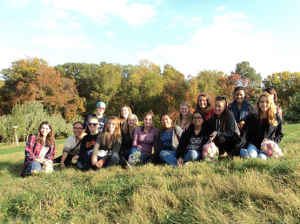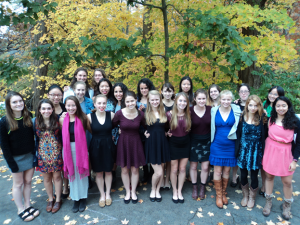Nontombi Naomi Tutu was the keynote speaker for Black history month this year. Tutu grew up in South Africa while her father, Desmond Tutu, was enacting the changes in her country that made him famous. She now lives in the U.S. and has taught at several universities, runs a consulting business, and speaks at events like this.
I can’t say anything about her consulting or her teaching, but I can attest to the fact that she is a wonderful speaker. She has a way of using her words to bring out the candor in everything she spoke about, even if the subject was painful, and yet she spoke about these painful topics in a way that supported our discovery of them and allowed us to feel the full scope of what her truths meant.
There are several things that I got out of her speech. A point that she kept coming back to was the idea of stories and how they can be told in many different ways. She began with this idea, when she spent a while speaking on the idea of Black history month, and how important it is to look back at the history of Black people, but also how this history is inseparably intertwined with the history of the larger world. The study of Black history, listening to these stories and really hearing them, inevitably makes one realize that they are hearing the history of the world.
The reason for her focus on stories was not fully explained until the question and answer session, when an audience member asked about the ways in which the country of South Africa had gone about helping their citizens to heal from the psychological wounds of apartheid. Tutu explained that South Africa is working very hard to start and continue the process of storytelling. She emphasized the importance of telling a story with such enormous effects on the individual and the community not once, but several times. It is important for people’s stories to not only be told, but to be really and sincerely heard, many times, over long periods of time, for there to be healing. It was at this point that I realized the importance of all of the stories that she had told throughout the course of her speech.
One of the most powerful stories she told was about Eugene de Kock, a police officer who had committed so many atrocities under apartheid that he had been nicknamed “Prime Evil” by the press. His story, while terrible, is a story that must be told, and listened to, and understood, for the sake of confronting past atrocities and learning from them. It was at this point that Tutu spoke about what she had heard de Kock and other individuals who spoke before the Truth and Reconciliation Commission say. De Kock said that he had become like a split person during that time, that there were two of him; one who loved his family and was a member of his community, and one who killed and did terrible thing. As a psych major, I found this incredibly interesting. There have been many studies in the field, especially studies that came out of WWII and the world’s knowledge about the truths of the Holocaust, that try to find out how people do terrible things. It is an interesting question: how do humans do the inhumane? Right there in the word is why it is so hard for people to wrap their heads around the question: the inhumane is not human. Since we are human, it seems like it must be impossible to do something that defies the human-ness of others, or even ourselves. But it happens everywhere. By denying others their humanity, we deny our own humanity. Tutu’s words about de Kock, while they do not explain this, make it clear why this is such an imperative question to explore, for each and every one of us to confront. De Kock differentiated the person who loved from the person who killed, and only in this way was he able to continue to do what he did. Tutu said that she struggled with this, that this seemed like a bad explanation, that it was the easy way out. She then said that she realized that many of us, not to that degree, have parts of ourselves that we love, parts that love and care and are exceptional, but there are parts of us that we are not proud of. While de Kock may be an extreme example of this, it is important to remember how close those dark parts of us are to the rest of us. Tutu emphasized how easy it is to do something that creates that part. This is why de Kock’s story is necessary. Yes, the story of Nelson Mandela is necessary, but the story of de Kock is too. We all have capacity to be good and evil. We always have a choice to acknowledge the humanity in others, and thus cultivate the humanity in ourselves, or to disregard and destroy the humanity in others, and thus eradicate the humanity in ourselves. We have to deeply and thoughtfully listen to these stories to figure out how.
I would like to thank Sisterhood, the Bryn Mawr chapter of the NAACP and the Pensby Center, as well as everyone else who helped to organize this event.



Recent Comments